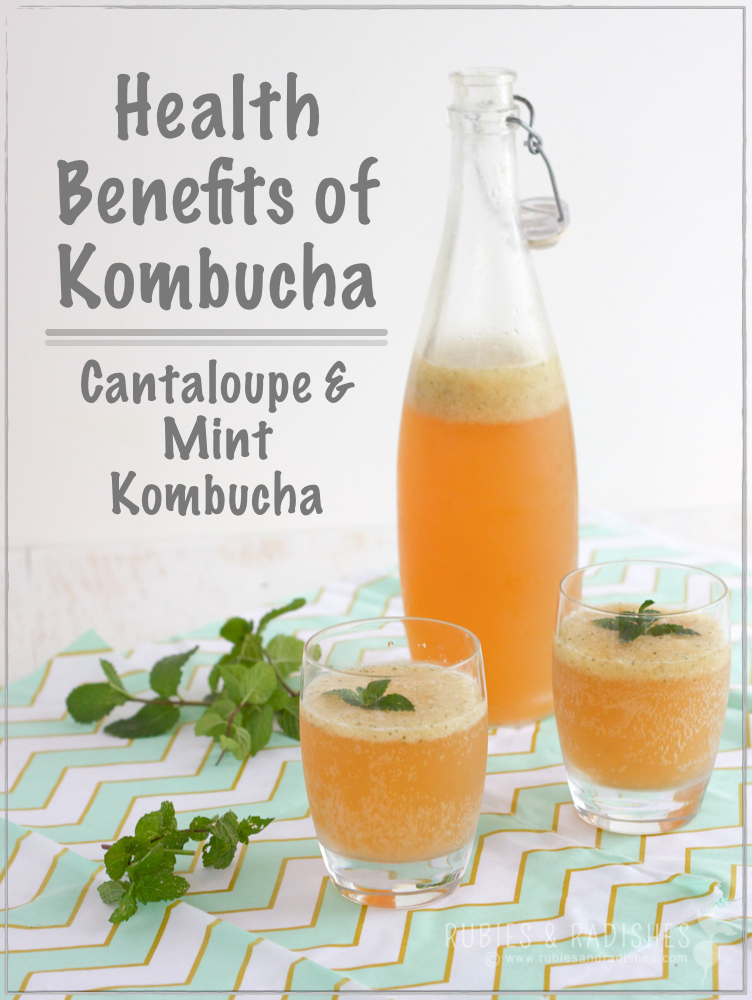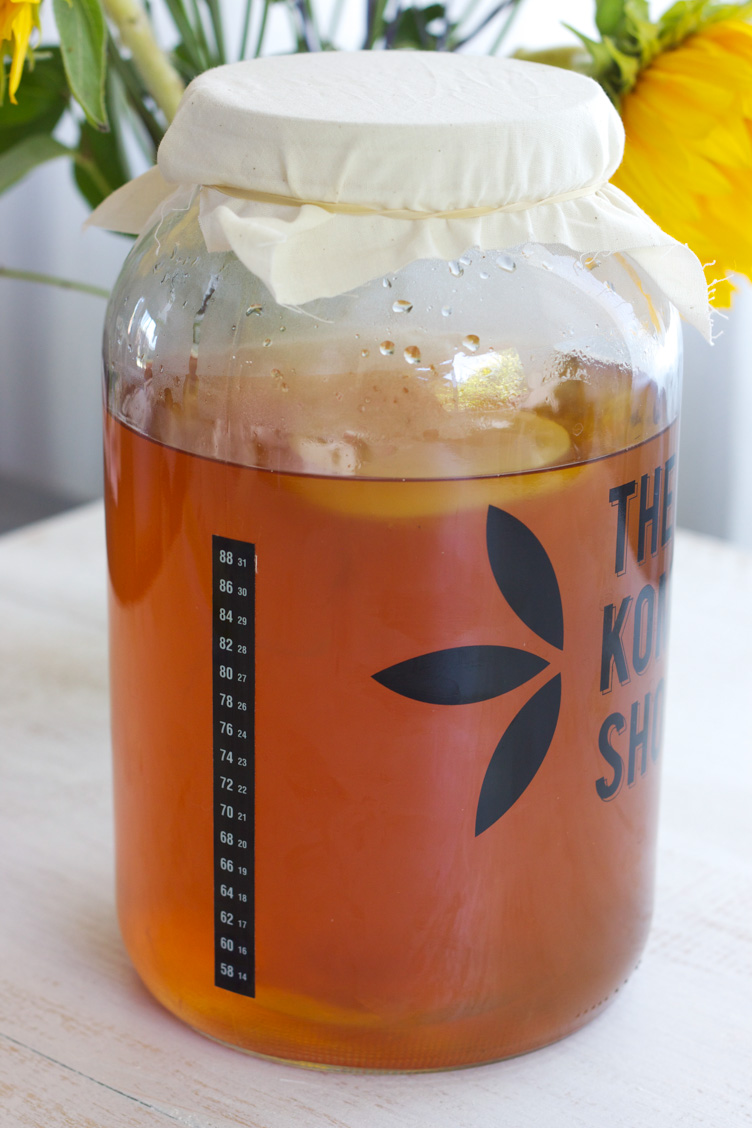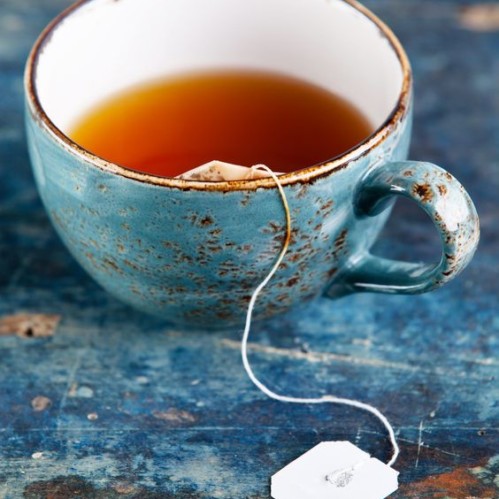One of our favorite summertime beverages is kombucha tea. It is so refreshing on a hot day! I often recommend kombucha to those of you that are new to the Paleo diet and are having trouble giving up soda. Kombucha has that familiar fizziness that you might still be craving, except instead of the nasty stuff you find in soda from sugar to chemicals, kombucha actually offers health benefits!
Purchasing kombucha at the health food store can add up quickly. Fortunately, it is really simple to make your own kombucha. I recently had an opportunity to try out the Kombucha Brewing Kit from The Kombucha Shop. If you can’t find a SCOBY (the live culture needed to ferment the tea) locally, I highly recommend this kit from The Kombucha Shop. It has everything you need to get started and they go the extra step to help you make a perfect batch, with their testing strips and thermometer.
Cantaloupe & Mint Kombucha
A big thanks to all of you that commented with suggestions on Instagram for my second fermentation. I just love all of you over there, it is such a fun environment. If you are on Instagram, come over and hang out with us!
I went with cantaloupe and mint. I used 1 cup of cantaloupe and 1 tablespoon of fresh mint. I blended it up in my Nutribullet. You could use any blender. I added the puree directly to my bottles of kombucha and then I sealed the bottles and set them aside in a dark place to get fizzy.
The cantaloupe and mint combo turned out incredibly delicious. It is our favorite batch of kombucha we have ever made. You can find really clear directions on how to bottle your second fermentation here.
I’ve invited Kate Tecku, the owner of The Kombucha Shop to share a little bit about the health benefits of kombucha with you!
What is Kombucha?
Kombucha tea, you’ve seen, you’ve heard about it, you’ve maybe even tried it. But what is this funky tea everyone seems to be talking about these days?
Like yogurt, sauerkraut, kimchi and other mainstays of the fermented food world, Kombucha is a carbonated drink made by combining the Kombucha culture with black or green tea, adding sugar and fermenting for a period of 10-14 days. The culture is sometimes referred to as a SCOBY, standing for Symbiotic Colony of Bacteria and Yeast.
Seemingly relegated to co-ops and natural food stores for decades, Kombucha has become widely popular as of late, popping up in mainstream grocery stores across the US.
The History of Kombucha
While Kombucha may be relatively new to Western culture, it’s been touted for its health benefits in Asian cultures for thousands of years. The history of Kombucha is a little murky, though most believe it came about during the Tsin Dynasty in China around BC 220. Some give credit to a Korean physician in 414 AD who brought it to Japan to treat Emperor Inkyo who had fallen ill.
Wherever this popular drink originated, it remained in Asia until the late 19th century when Kombucha made its way to Russia and became a mainstay in homes as an everyday health tonic. It slowly spread across Europe and enjoyed a brief resurgence in popularity following WWII. By the 1960’s Kombucha had landed in America and quickly found a fan base within the growing natural health movement.
The Health Benefits of Kombucha
Today, when people ask me, “Is Kombucha actually that good for you?” I often respond, “I’m not sure!” I know it makes me feel better but I remind folks everyone’s bodies are different. I like to drink it in the afternoon to feel more alert without the high and crash that comes with sugar or caffeine laden beverages. My tummy feels better after a glass, I’m more regular, and my skin, hair and overall immune system seems much healthier.
While Kombucha probably isn’t the cancer-healing-cure-all that some claim it to be, it does have some very real health benefits. It’s loaded with many beneficial probiotics, acids and active that work to balance the gut and improve digestive function. It also provides potent antioxidents, B vitamins, and has reported antiviral and antimicrobial properties.
Over the last few years, numerous studies have been conducted finding many of Kombucha’s long believed health claims are holding up to Western style scientific study. While no human trials have yet to be done on the beverage, a 2012 study conducted on diabetic rats showed Kombucha to have statistically significant curative effects, including lowered glucose levels and improved liver and Kidney functions.
Oftentimes, the herbs or spices added to the drink work in concert with the active properties in Kombucha. Ginger, a very common (and my favorite) ingredient to add to Kombucha, aids in digestion and offers anti-inflammatory properties as well. Oh, and it tastes delicious.
If you are in general good health, drinking Kombucha in moderation can be a wonderful addition to a healthy diet. It’s been well documented by now that the healthiest cultures around the world have historically eaten some form of fermented foods every day. While Western science is still trying to understand just exactly the role probiotic rich foods play in our bodies, I simply love the taste and knowing that I’m taking small steps to improve my health every day.
References:
- http://www.ncbi.nlm.nih.gov/pubmed/8559192
- http://www.ncbi.nlm.nih.gov/pubmed/10888589
- http://www.ncbi.nlm.nih.gov/pubmed/22591682
- http://www.healthylivingmagazine.us/Articles/371/13







I just want to warn everyone that kombucha may cause adverse reactions in your body. Pay attention to what your body is telling you when you start drinking it. I was brewing my own for 1-1/2 months. During that time my breasts hurt. I believe it was the yeast in the kombucha that caused this reaction. I stopped drinking the tea and my pain went away within 3 days. While I think the tea was doing wonders for my digestive system, the breast pain was not something that I wanted to live with. So, drink with caution!
Thank you for sharing your experience, Kelly! I absolutely agree that all of our bodies are different and we need to pay close attention to how we react to different foods, even ones with health benefits.